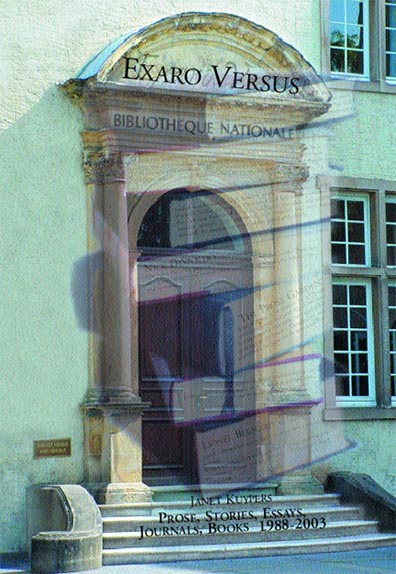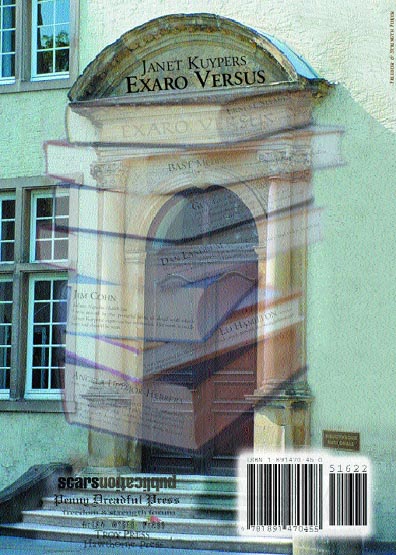![]()
![]()
![]()

http://www.ArtistFirst.com 9/11/03
Welcome to all of our listeners out there tonight. We’re talking to Janet Kuypers, the author of many different poetry books, and the new novel The Key To Believing about AIDS and a government conspiracy. If you could tell us even more than what I’ve told all of our listeners about all of the different literary experiences that you do and create, that would be wonderful.
I’ve written poetry for probably over twenty years and I’ve probably got four or five books of poetry published, starting in 1993. I run a web site for Scars Publications, and they’ve got everything from information about their magazines, as well as downloadable chapbooks (PDF files), there’s a news and philosophy text archive, we’ve got sound files in our audio and video section, there’s some really cool stuff there. Primarily what I’m doing a lot of now is performance art as well as trying to get my work out to people, and setting up shows, not only with poetry, but with Journals and short stories as well, and setting them up with images in a display and music in the background (because I’m a photographer and do some music in my spare time).
Janet is going to tell us a bit more about her past books.
The first book was published in 1993, it is called Hope Chest In The Attic, because it is the idea of all those things you want to store up, it is a collection of thirteen years of poetry and prose and art from me. The second one is called The Window, and that one has a lot of writings that are parts of their own series. Some are stories, and are parts of a series of what people tell you, and this was the window I was looking through. The third book I did probably has the best title of them all; it’s called Close Cover Before Striking.
I like that one too...
The byline says, “the book of poetry, prose, political essays, artwork and philosophical rants ... so I get to delve into having more essays and philosophy in my work, instead of just having lists of poetry. I did a very short novel in letter form, called Autumn Reason, and I also did a spiral-bound book all about the clash between the sexes, because long ago I did work as an acquaintance rape workshop facilitator, and got to hear people’s stories about dealing with rape - stories about what people have heard or about what has happened to them, so I have this book called (Woman.), which has a bunch of pieces, some never published, a lot of short stories, and the last, or more recent, wide-spread book of poetry is called Contents Under Pressure. And that one also has quite a few short stories, and a lot of political pieces and essays in it, probably more than in any other book. I’ve done a few small printing runs of books, another woman’s book called The Average Guy’s Guide (To Feminism), and I also did one after traveling around the United States by car with a friend called Changing Gears, and it was a bunch of journal entries and stories about going from state to state and what we saw, and what bizarre experiences we’d go through in meeting new people and finding a place to stay. Those were most of them, expect the bug, huge novel, the six hundred-fifty page opus called The Key To Believing. It’s a private printing, which we have done right now for it, I’m working with agents right now to get it trimmed down for dealing with a publisher. But that book is about medical researchers that are looking for a cure, or medicines for AIDS patients, and one of them stumbles upon information that leads them to believe that there is a government conspiracy about the origin. And that they may also possess the cure for AIDS. It always started off with a more intelligent bent on learning more about the virus, but it them also becomes much more action-packed, about trying to figure out how to save lives, save their own lives when they got this information, from agents.
Now I, Jade Logan, have read this book, and she did keep my interest all the way to the end.
All those pages?
Yes. Now, I have a bad habit when I find something not quite interesting, I skip over it, so I’m glad you’re going to an agent but I did read all the way to the end, I didn’t skip any large portions, like I have in some other people’s books...
Well, that’s good to hear. Thanks. I know there are a lot of details and a lot of information in there, so there’s a lot that goes on within the story, I mean learning about the virus and learning how to live a healthier life is one thing, but learning about the fictional aspect, the government angle on having a cure or learning about the creation of AIDS, is another one altogether.
The main character in the book is a researcher, who’s researching into AIDS drugs that help people that have AIDS, and she finds out in the story, what is it the CIA, or some part of the government, had supposedly created AIDS and had an instantaneous cure for it.
Because they had the base components of the virus to begin with, they were able to create a cure for it. That’s the story behind it. And then she first had to actually figure out if that information was true or not, because she was only getting bits and pieces of evidence. And she’s a researcher, she deals with science, so she’s trying to grapple with and learn more about what’s going on. And then the people she gets this information from, they start dying, and suddenly she’s like, “Why are they- what’s happening...?” and then she starts trying to get more pieces together to see if there’s any truth to this story. And then she tries to see if there’s anything she can do to actually fight the all-powerful government, to be able to help people out at all.
Definitely a mystery, thriller, conspiracy theory type book, all wrapped into one.
Yeah, I don’t know what you’d call it. Is it a mystery? Well, there’s mystery to it, but there’s so much in there...
And there’s a lot of philosophy in there, because I think the main characters possess qualities you don’t quite often see or read or hear about. But she was able to figure out, with using as much science to find out what she could, and those things are what gave her that kind of drive that people don’t often experience.
In the book that you sent me, Hope Chest in the Attic, at the beginning of this you did say that some of the items mixed fiction and...
Oh yeah, that’s what I’d usually say about most everything I’ve written, I mean, usually if you’re going to write something down, even if it comes from something that you’ve understood or experienced or lived through, your own interpretation of it, versus how other would see it, might seem fictitious. Everyone puts their own spin or interpretation on things, and the words you choose to use are a way to get an emotion across to the reader. So I would say that even when there are elements of truth in something written of mine, there will also always be something to make the writing stronger, which might be a bit of fiction.
Would you like to tell everyone how your writing process usually goes?
Well, I don’t think I ever have writer’s block, because I only choose to write when I think of something worthy of writing about. So I don’t write daily and constantly... The only time I’ve ever had a deadline was with this most recent book, The Key To Believing, and I had made a decision that I was going to work on it when I was on a trip and away from other distractions, and because I had nothing in front of me, and when I said I wanted to work on the novel, I actually finished the first draft of the novel. I had an idea of what I wanted, and I generated an outline, and I previously had time to think about what the main characters would feel and how they would act in any situation, so I was then able t start writing the major content of the novel all at once.
I don’t go through writer’s block, because I’ll only write if I feel like it, I mean I wouldn’t call that writers block if I just don’t happen to fell like writing a short story or a poem. Often with writing as poem, it usually comes up after one moment, and I sit down and I write the entire poem at once. When I write like this, I do so because I need to get it out of my system, so I try to think of a way to out it to words, because if I can do that, it will help me to process bad experiences and events that I have seen or gone through in, my life, and it will help me get it out of my system, which can also become therapeutic.
Is that why you frequently write about women’s issues, and why you studied them in college?
My writing would be about things like that, and no, I’m not the woman that went up in a meeting and asked what could be done to help prosecute a rapist, I’m not the woman that said I was raped six days ago, but this is what you write about, because this is what you see around you, and I put myself into the element to hear all of these things. So yeah, a lot of women’s issues will come out, I don’t try to make my work scream for women’s issues.
I don’t think The Key To Believing is a woman’s issue at all.
No...
I mean, the lead character is a female, she’s a female researcher, but she’s a very hard-working, and she doesn’t think of herself in those was, so I don’t necessarily think of that as an ‘empowering woman’ issue when I wrote that novel. She’s just a woman, and like others, is hard working, driven and very intelligent.
I’d like to remind everyone that you’re listening to the ArtistFirst Network, and this is the Authors First Show, I am Jade Logan, your host, and I’m interviewing Janet Kuypers, who has written man different poems , essays, a novel or two, and does lots of performance work in the Chicagoland area.
This was from a live radio interview at http://www.ArtistFirst.com on September 11, 2003.
![]()
![]()
![]()

